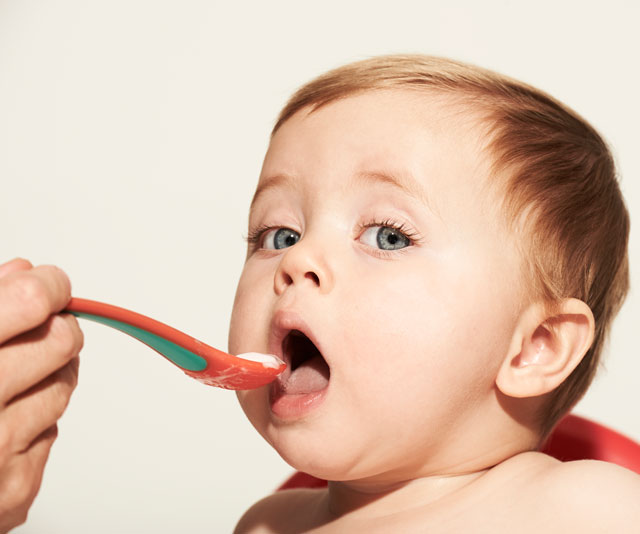Baby-led feeding has great benefits for your bub, from helping her to learn her food intake to refining her motor skills.
What is it? Baby-led feeding means forgetting purees and spoons, and simply letting your baby feed herself.
The World Health Organization recommends exclusive breastfeeding until six months. By this time, your baby should be sitting up straight and have good neck and shoulder control.
Start by offering mashed easy-to-digest fruit and vegetables, such as pumpkin, potato, sweet potato, banana and cooked pears and apples.
Nutrition expert and mum-of-two Vanessa Clarkson is a huge advocate for healthy eating and the author of, Real Food for Babies & Toddlers.
We asked her to share her best tips for feeding babies safely, with nourishing delicious foods.
What are the benefits of baby-led feeding?
While there are obvious benefits to babies feeding themselves, most notably in providing the opportunity to practise their motor skills, there are many other positives that are perhaps more subtle.
There is an early window from around the six-to 12-month mark when babies are open to exploring new tastes and textures, and by introducing real, whole, recognisable food from the get-go we are making the most of that important time.
Finally, allowing babies to set their own pace at mealtimes enables them to retain control of what and how much they want to eat.
Does it matter if your baby doesn’t eat much?
In the very early days of first food it’s unlikely your baby will manage to eat much. Their feeding skills need time to develop and their nutritional needs will mostly be met by breast milk. In time, they will start to eat more, but remember that making a mess is all part of the learning experience.

Allow your little one to set their own pace at mealtimes and retain control of what and how much they want to eat.
(Getty Images)What are good foods to start with?
Good starter foods are those that are long, thin and relatively soft, often called finger foods. These enable a baby to easily hold one half and put the other half in their mouth. Even without teeth, most babies can effectively munch soft foods with their hard gums from around six months old.
Ideas include soft pieces such as banana, orange segments (no pips), very ripe peach or pear, sticked of cooked vegetables such as carrot or zucchini, slow-cooked strips of meat or poultry, strips of omelette or toast ‘soldiers’.

Even without teeth, most babies can munch soft food with their hard gums.
(Getty Images)What are some foods to avoid?
Unless a baby has a diagnosed sensitivity to a food, there is very little restriction in what you can offer them. The most important thing to be mindful of is choking and ensuring that foods offered are age-appropriate. So, hard foods such as raw carrot or apple or very small foods such as whole nuts that can get lodged in the throat should not be given. Babies under one year should also not be offered honey in any form because of the risk of botulism.

